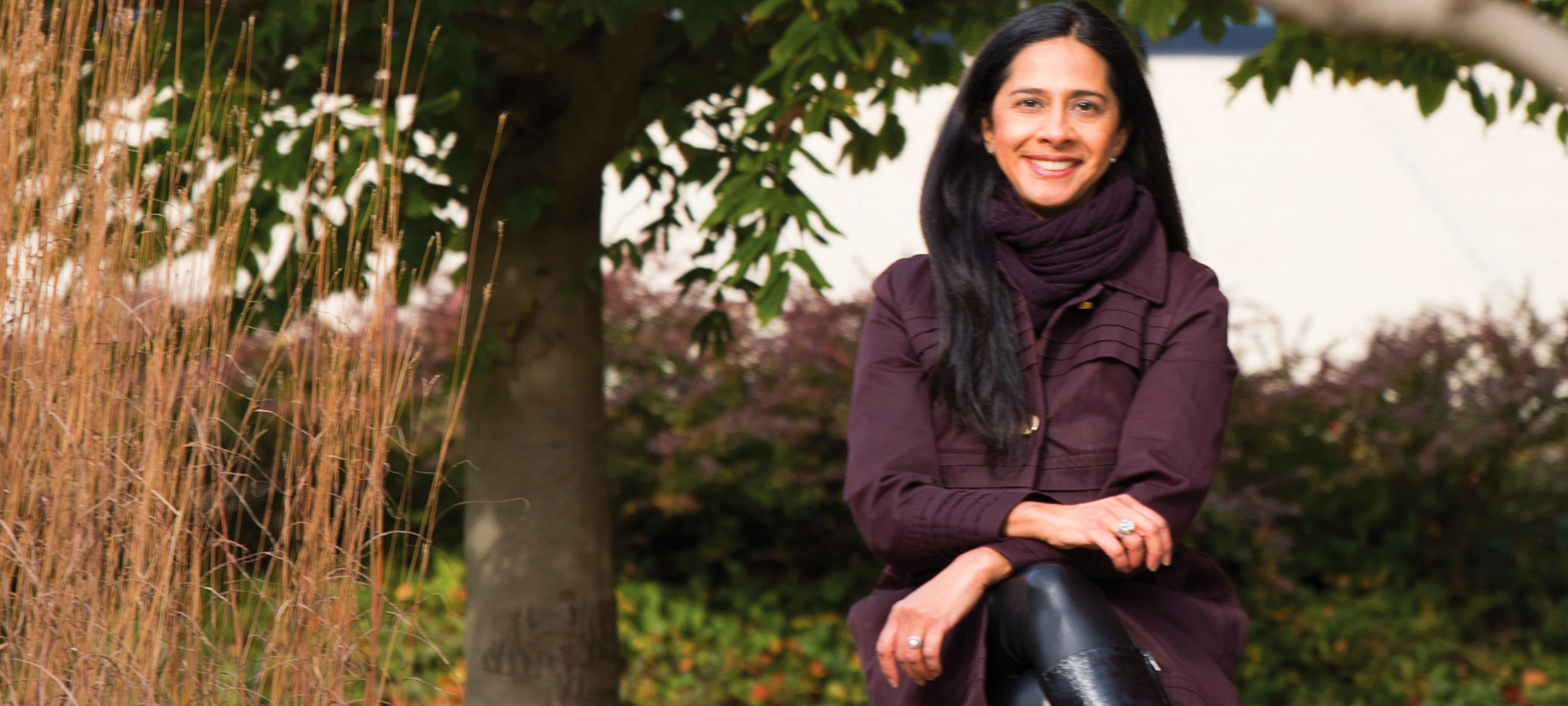
Author Samira Ahmed, AB’93, MAT’93, on campus. Before the COVID-19 pandemic, she sometimes broke up her routine by writing in Mansueto Library. (Photography by Jean Lachat)
Growing up, author Samira Ahmed, AB’93, MAT’93, never read a book with a Muslim protagonist. Now she’s written three.
@sam_aye_ahm: She wants to make films & kiss boys--her Muslim parents forbid both. Will a terrorist & Islamophobia shatter her dreams? #pitmatch #YA #CON
@ericsmithrocks: *breaks mouse clicking like button so hard*
Samira Ahmed, AB’93, MAT’93, worked on her manuscript “Swimming Lessons” for seven years, off and on. Mostly off. “I wasn’t even sure how to start,” she says. “I would just—as all writers do—procrastinate by doing research on how to write a book.”
She didn’t like any of the advice she read: cloud diagrams, outlining. Finally she tried writing her idea as a short story. Set at an Indian wedding, that story became part of the first chapter of a “sprawling” 120,000-word manuscript.
Ahmed’s novel centers on 17-year-old Maya Aziz, the only Muslim girl in her Batavia, Illinois, high school. She has a secret boyfriend, as well as an acceptance letter to film school that her parents don’t know about. The family conflict is set against a background of rising Islamophobia.
In 2016, with a trimmed-down manuscript, Ahmed entered Pit Match, a Twitter contest that connected aspiring authors with agents; four days later, she was signed. Her young adult (YA) novel, published as Love, Hate & Other Filters (Soho Teen, 2018), was on the New York Times best-seller list in less than a month.
Now that Ahmed has found a writing practice that works for her, she’s published two more YA books in two years. “I write a short story first. That’s my treatment,” she says. “I write a story around the protagonist, try to get a couple other main characters in there, and see if I like where this could go. Do I like that character and world enough to write 70,000 or 80,000 words or more?”
Her second book, Internment (Little, Brown, 2019), explores similar themes as the first, but it’s set in a bleaker world. After the election of an Islamophobic president, Muslims are rounded up and sent to an internment camp. The protagonist, Layla Amin, rebels against her new circumstances—disregarding the objections of her parents and some camp inmates, who just want to survive. Internment was named one of the best books of 2019 by Kirkus Reviews, which described the book’s setting as “a Trump-like America” and categorized it as “realistic fiction.”
This year Ahmed published her third book, Mad, Bad & Dangerous to Know (Soho Teen). The title, as contemporary as it sounds, comes from a description of Lord Byron by one of his spurned lovers.
The narration alternates between Khayyam Maquet, a French American teenager spending the summer in Paris in the present day, and Leila, struggling to survive in a harem 200 years earlier. The book draws on research Ahmed did more than 25 years ago for her bachelor’s thesis, which examined Byron’s poetry in the context of Napoleon’s conquest of Egypt.
One of the poems Ahmed analyzed was “The Giaour.” In the poem Leila, a member of a harem, is thrown into the ocean in a sack as punishment for infidelity. Although the poem is long and features multiple points of view, Leila “literally has no voice in the story at all,” Ahmed says. In Mad, Bad & Dangerous to Know, she finally gets her voice.
Growing up Ahmed never read a single book with a Muslim protagonist. “Every child should be able to see themselves as a hero on the page,” she says. “The first time I felt like I saw myself in a book—that wasn’t written by an Indian in Hindi or Urdu and then translated—was Jhumpa Lahiri’s Interpreter of Maladies.” Multiple stories in the collection, published in 1999, made Ahmed think, “Yes, this is a piece of me here.”
After graduating from UChicago, Ahmed taught high school, first in the Chicago suburbs, then in New York. “I just love those teen years. It’s such an interesting group to teach and to write for,” she says. “Teens are really on the threshold between childhood and adulthood—a liminal space, a space that has hope in it. I naturally am a writer who leans into hope.”
